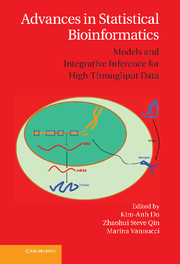Book contents
- Frontmatter
- Contents
- List of Contributors
- Preface
- 1 An Introduction to Next-Generation Biological Platforms
- 2 An Introduction to The Cancer Genome Atlas
- 3 DNA Variant Calling in Targeted Sequencing Data
- 4 Statistical Analysis of Mapped Reads from mRNA-Seq Data
- 5 Model-Based Methods for Transcript Expression-Level Quantification in RNA-Seq
- 6 Bayesian Model-Based Approaches for Solexa Sequencing Data
- 7 Statistical Aspects of ChIP-Seq Analysis
- 8 Bayesian Modeling of ChIP-Seq Data from Transcription Factor to Nucleosome Positioning
- 9 Multivariate Linear Models for GWAS
- 10 Bayesian Model Averaging for Genetic Association Studies
- 11 Whole-Genome Multi-SNP-Phenotype Association Analysis
- 12 Methods for the Analysis of Copy Number Data in Cancer Research
- 13 Bayesian Models for Integrative Genomics
- 14 Bayesian Graphical Models for Integrating Multiplatform Genomics Data
- 15 Genetical Genomics Data: Some Statistical Problems and Solutions
- 16 A Bayesian Framework for Integrating Copy Number and Gene Expression Data
- 17 Application of Bayesian Sparse Factor Analysis Models in Bioinformatics
- 18 Predicting Cancer Subtypes Using Survival-Supervised Latent Dirichlet Allocation Models
- 19 Regularization Techniques for Highly Correlated Gene Expression Data with Unknown Group Structure
- 20 Optimized Cross-Study Analysis of Microarray-Based Predictors
- 21 Functional Enrichment Testing: A Survey of Statistical Methods
- 22 Discover Trend and Progression Underlying High-Dimensional Data
- 23 Bayesian Phylogenetics Adapts to Comprehensive Infectious Disease Sequence Data
- Index
- Plate section
13 - Bayesian Models for Integrative Genomics
Published online by Cambridge University Press: 05 June 2013
- Frontmatter
- Contents
- List of Contributors
- Preface
- 1 An Introduction to Next-Generation Biological Platforms
- 2 An Introduction to The Cancer Genome Atlas
- 3 DNA Variant Calling in Targeted Sequencing Data
- 4 Statistical Analysis of Mapped Reads from mRNA-Seq Data
- 5 Model-Based Methods for Transcript Expression-Level Quantification in RNA-Seq
- 6 Bayesian Model-Based Approaches for Solexa Sequencing Data
- 7 Statistical Aspects of ChIP-Seq Analysis
- 8 Bayesian Modeling of ChIP-Seq Data from Transcription Factor to Nucleosome Positioning
- 9 Multivariate Linear Models for GWAS
- 10 Bayesian Model Averaging for Genetic Association Studies
- 11 Whole-Genome Multi-SNP-Phenotype Association Analysis
- 12 Methods for the Analysis of Copy Number Data in Cancer Research
- 13 Bayesian Models for Integrative Genomics
- 14 Bayesian Graphical Models for Integrating Multiplatform Genomics Data
- 15 Genetical Genomics Data: Some Statistical Problems and Solutions
- 16 A Bayesian Framework for Integrating Copy Number and Gene Expression Data
- 17 Application of Bayesian Sparse Factor Analysis Models in Bioinformatics
- 18 Predicting Cancer Subtypes Using Survival-Supervised Latent Dirichlet Allocation Models
- 19 Regularization Techniques for Highly Correlated Gene Expression Data with Unknown Group Structure
- 20 Optimized Cross-Study Analysis of Microarray-Based Predictors
- 21 Functional Enrichment Testing: A Survey of Statistical Methods
- 22 Discover Trend and Progression Underlying High-Dimensional Data
- 23 Bayesian Phylogenetics Adapts to Comprehensive Infectious Disease Sequence Data
- Index
- Plate section
Summary
Introduction
The practical utility of variable selection is well recognized, and this topic has been the focus of much research. Bayesian methods for variable selection have several appealing features. They address the selection and prediction problems in a unified manner, allow rich modeling via the implementation of Markov Chain Monte Carlo (MCMC) stochastic search strategies and incorporate optimal model averaging prediction strategies; they extend quite naturally to multivariate responses and many linear and nonlinear settings; they can handle the “small n–large p” setting (i.e., situations in which the number of measured covariates is much larger than the sample size); and they allow past and collateral information to be easily accommodated into the model through the priors.
The flexibility of the variable selection approach, in particular the fact that it can handle the “large p–small n” paradigm, has made Bayesian methods particularly relevant for the analysis of genomic studies, in which high-throughput technologies allow thousands of variables to be measured on individual samples. In this chapter we discuss recent contributions from our group on methods for integrative genomics. First, we focus on methods that integrate external biological information into the analysis of gene expression data. We consider a linear model that predicts a phenotype based on predictors synthesizing the activity of genes belonging to same pathways and encode into the prior model information on gene-gene networks, as retrieved from available databases.
- Type
- Chapter
- Information
- Advances in Statistical BioinformaticsModels and Integrative Inference for High-Throughput Data, pp. 272 - 291Publisher: Cambridge University PressPrint publication year: 2013
- 1
- Cited by



